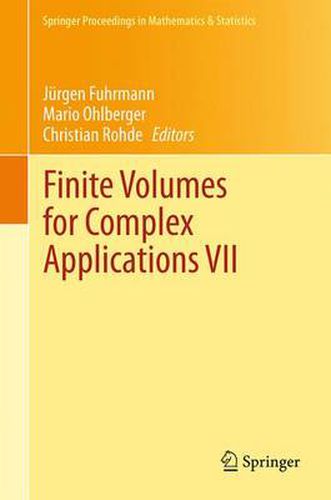Readings Newsletter
Become a Readings Member to make your shopping experience even easier.
Sign in or sign up for free!
You’re not far away from qualifying for FREE standard shipping within Australia
You’ve qualified for FREE standard shipping within Australia
The cart is loading…






The first volume of the proceedings of the 7th conference on Finite Volumes for Complex Applications (Berlin, June 2014) covers topics that include convergence and stability analysis, as well as investigations of these methods from the point of view of compatibility with physical principles. It collects together the focused invited papers, as well as the reviewed contributions from internationally leading researchers in the field of analysis of finite volume and related methods. Altogether, a rather comprehensive overview is given of the state of the art in the field. The methods considered in the 7th conference on Finite Volumes for Complex Applications (Berlin, June 2014) have properties which offer distinct advantages for a number of applications. The second volume of the proceedings covers reviewed contributions reporting successful applications in the fields of fluid dynamics, magnetohydrodynamics, structural analysis, nuclear physics, semiconductor theory and other topics. The finite volume method in its various forms is a space discretization technique for partial differential equations based on the fundamental physical principle of conservation. Recent decades have brought significant success in the theoretical understanding of the method. Many finite volume methods preserve further qualitative or asymptotic properties, including maximum principles, dissipativity, monotone decay of free energy, and asymptotic stability. Due to these properties, finite volume methods belong to the wider class of compatible discretization methods, which preserve qualitative properties of continuous problems at the discrete level. This structural approach to the discretization of partial differential equations becomes particularly important for multiphysics and multiscale applications. Researchers, PhD and masters level students in numerical analysis, scientific computing and related fields such as partial differential equations will find this volume useful, as will engineers working in numerical modeling and simulations.
$9.00 standard shipping within Australia
FREE standard shipping within Australia for orders over $100.00
Express & International shipping calculated at checkout
The first volume of the proceedings of the 7th conference on Finite Volumes for Complex Applications (Berlin, June 2014) covers topics that include convergence and stability analysis, as well as investigations of these methods from the point of view of compatibility with physical principles. It collects together the focused invited papers, as well as the reviewed contributions from internationally leading researchers in the field of analysis of finite volume and related methods. Altogether, a rather comprehensive overview is given of the state of the art in the field. The methods considered in the 7th conference on Finite Volumes for Complex Applications (Berlin, June 2014) have properties which offer distinct advantages for a number of applications. The second volume of the proceedings covers reviewed contributions reporting successful applications in the fields of fluid dynamics, magnetohydrodynamics, structural analysis, nuclear physics, semiconductor theory and other topics. The finite volume method in its various forms is a space discretization technique for partial differential equations based on the fundamental physical principle of conservation. Recent decades have brought significant success in the theoretical understanding of the method. Many finite volume methods preserve further qualitative or asymptotic properties, including maximum principles, dissipativity, monotone decay of free energy, and asymptotic stability. Due to these properties, finite volume methods belong to the wider class of compatible discretization methods, which preserve qualitative properties of continuous problems at the discrete level. This structural approach to the discretization of partial differential equations becomes particularly important for multiphysics and multiscale applications. Researchers, PhD and masters level students in numerical analysis, scientific computing and related fields such as partial differential equations will find this volume useful, as will engineers working in numerical modeling and simulations.